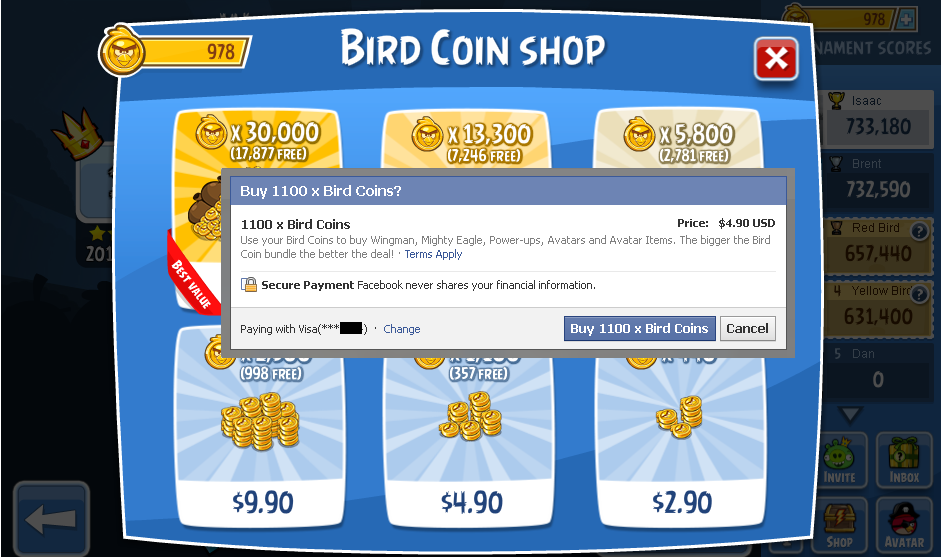For the millions of Americans who play game apps on their mobile device or within Facebook, the concept of buying extra in-game features, power-ups, new tools or other items is familiar. Hardcore gamers also see these purchase options, whether using a gaming console or their PC.
Some of the most common purchases are virtual casino chips, Angry Birds special powers, Farmville tools and weapons.
In essence, the user/gamer is trading real money for a digital product. While that product may not exist outside of the game, it is a transaction that has value. In fact, worldwide it is a billion dollar industry, and one that has gone untaxed even by states and other jurisdictions that likely already have the legal authority to tax the transactions.
The question, of course, is how to tax them. They are sales, so the sales tax is the obvious solution if states already have provisions for taxing transactions involving non-real property. The challenges are many, however, starting with: Where should the purchase be taxed? If a Florida gamer makes the in-game purchase while playing an online game that has servers based in California, which state has jurisdiction? Is there nexus?
Curiously, the issue gets further complicated because of the ease with which game players can make the purchase: With their credit card data that is stored in the mobile commerce app in Facebook, or even easier, by having the charges applied to their mobile phone/data bill.
In most cases, the developer of the game apps don’t have access to the user’s address because of Facebook’s privacy regulations regarding data sharing with developers. So how are they supposed to determine the location of the transaction? And what if the mobile user from Florida is actually playing the game and making the purchase while on a business trip in New York?
GPS may be an eventual answer, but more hurdles appear with each scenario. With most states still badly seeking revenues for their coffers, they will certainly be looking at these purchases more closely in the near-term.
Live Gamer Partners with Avalara for International Sales Tax/VAT Calculation
To help game developers get in front of this issue, the sales tax automation company Avalara has partnered with Live Gamer, the world’s leading provider of digital commerce solutions for the interactive entertainment industry. Under the agreement, Avalara’s suite of cloud-based tax services is now available to Live Gamer customers. Live Gamer provides 100+ payment options worldwide and local offers in more than 200 countries, allowing customers to earn revenue on a global scale.
“Avalara has the infrastructure and expertise to support our complex global microtransaction business,” said Andrew Schneider, president and co-founder of Live Gamer. “The complexity of our business is significant because we support companies and consumers in almost every country in the world. Avalara is a quick, go-to-market global tax partner who can meet our needs both now and in the future.”
In addition to the US and Canada, Avalara supports customers in 79 countries in Europe, Asia, Latin America, and the Pacific Rim. It serves tens of thousands of registered users globally and calculates VAT, sales and use taxes on more than one billion transactions annually. “Avalara simplifies the complexity of indirect tax management and makes compliance easy and affordable for businesses of all sizes around the world,” said Avalara Founder and CEO Scott McFarlane. “Avalara can help Live Gamer customers increase their efficiency – and minimize the risk of an audit – no matter where they conduct business.”
Founded in 2004, Avalara pioneered a service-based platform for sales tax and compliance automation and has been recognized for years as one of America’s fastest growing technology firms. The company’s cloud solutions help thousands of customers stay focused on their core businesses by providing automated end to end compliance services including sales and use tax calculation, exemption certificate management, filing and remittance, and a broad array of related services.
Avalara built its technology platform and extensive user base using internal expertise and the strategic acquisition of industry leading organizations, technologies, and personnel. Operating behind the scenes via seamless integration with virtually any business management system, Avalara delivers fast, easy, accurate, and affordable solutions for companies of any size.
Thanks for reading CPA Practice Advisor!
Subscribe Already registered? Log In
Need more information? Read the FAQs
Tags: Automation, Sales Tax




